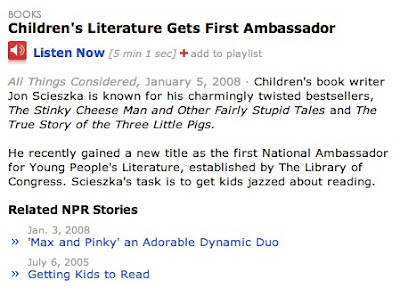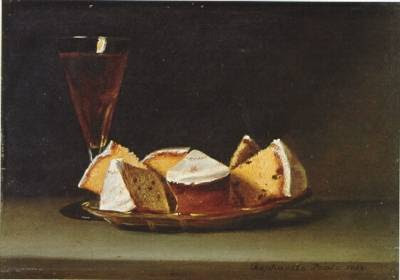
One of my favourite authors, John Scieszka has been named the Library of Congress's first National Ambassador for Young People's Literature. Listen to a short interview with him, where he also mentions that his his newest book is the first book in a planned series of 50!
Viewing: Blog Posts Tagged with: library of congress, Most Recent at Top [Help]
Results 26 - 29 of 29
Blog: Jago Illustration (Login to Add to MyJacketFlap)
JacketFlap tags: author, News, US, library of congress, john scieszka, Add a tag
Blog: OUPblog (Login to Add to MyJacketFlap)
JacketFlap tags: food, Law, UK, Politics, Current Events, oxford, torture, A-Featured, rights, human, oupblog, VSI, clapham, coercion, geneva, Add a tag

By Kirsty OUP-UK
In the latest of my monthly Very Short Introductions columns, I have been speaking to Andrew Clapham, author of Human Rights: A Very Short Introduction. Andrew is Director of the Geneva Academy of International Humanitarian Law and Human Rights, and Professor of Public International Law at the Graduate Institute of International Studies, Geneva. He has also been a Representative of Amnesty International to the UN in New York, and has written several books on human rights for OUP.
OUP: What has caused the recent backlash in Britain against ‘human rights culture’ and the Human Rights Act? (more…)
Blog: Writing from the Lemonade Stand (Login to Add to MyJacketFlap)
JacketFlap tags: library of congress, contests for kids, gwendolyn brooks, contests for kids, library of congress, gwendolyn brooks, Add a tag
Here's a great contest that gets kids to read and write while connecting them to their favorite authors:
"The Center for the Book in the Library of Congress, in partnership with Target Stores and in cooperation with affiliate state centers for the book, invites readers in grades 4 through 12 to enter Letters About Literature, a national reading-writing contest. To enter, readers write a personal letter to an author, living or dead, from any genre-- fiction or nonfiction, contemporary or classic, explaining how that author's work changed the student's way of thinking about the world or themselves."
Info here: http://www.loc.gov/loc/cfbook/letters.html
It made me think about the books I read as a child and wondered who I would have written. As an elementary student, I read Nancy Drew, Trixie Belden, and books of similar ilk. But then I also read every book on World War II and being a Catholic school girl, I read a lot of books about the saints. Then in high school, I read a lot of political fiction (Allen Drury, Fletcher Knebel), and then Arthur Hailey books plus sci-fi writers like Isaac Asimov. I also read a lot of scripts from Broadway plays, checking out the Best of Broadway book from the library each year.
But I'm pretty sure the person I would have written would have been Gwendolyn Brooks. Her poetry really resonated with me, and as a student in the 1950s and 1960s, she was one of the few African American female writers I knew. Literature today is so much more diverse and I hope students will take advantage of this opportunity to tell the writers who speak to them how much they matter.
Blog: The Excelsior File (Login to Add to MyJacketFlap)
JacketFlap tags: wolf, cake, grimmoire, brothers grimm, torture, Add a tag
I'm starting to get deja vu. Not the pleasant kind of dejavu where I go Yeah, I remember this but the kind where I'm beginning to feel that story elements take on a mix-n-match approach. Take one girl, put her in a forest, have her meet a wolf...
Yes, this is Little Red Riding Hood. How she got her nickname is going to sound familiar to any parent: she loved her little hooded cape so much she'd wear it as often as she could. Boys get their lucky shirts and socks and whatnot that are essential for sports, girls like that one pair of jeans that they'll share with their friends four summers running, Red likes her hoodie.
No real revelations in the story itself this time, this chestnut's as old as they come. Innocent Red goes to granny's and the crafty wolf eats her just as he's already eaten her feeble old granny. The huntsman comes along, hears "granny" sleeping off her food coma, discovers it's the wolf and, well now, wait a minute. While the wolf sleeps he cuts open his belly and removes both granny and Red without waking him? He swallowed them whole? Then they fill his belly with heavy rocks and sew him back up? And he wakes up, goes into shock and dies then? Sounds a bit like those urban legends about people who wake up in their bathtubs with a note and a cell phone telling them they have half an hour to call 911 because their kidneys have been kidnapped. I know I've read this about the belly being refilled with rocks before and it strikes me as both cruel and unusual punishment. What is the logic or reasoning behind not just killing the animal up front and releasing the prisoners within, why go through all that just to let the animal die with the shock and recognition? It isn't like they need to interrogate the wolf for information vital to national security (thus justifying their torture).
Sounds a bit like those urban legends about people who wake up in their bathtubs with a note and a cell phone telling them they have half an hour to call 911 because their kidneys have been kidnapped. I know I've read this about the belly being refilled with rocks before and it strikes me as both cruel and unusual punishment. What is the logic or reasoning behind not just killing the animal up front and releasing the prisoners within, why go through all that just to let the animal die with the shock and recognition? It isn't like they need to interrogate the wolf for information vital to national security (thus justifying their torture).
Interestingly, the story doesn't end there. The Grimm's continue with "There is also another tale..." where Red is on her way to granny's again, but this time she is all the wiser. She sees the wolf and races ahead to warn granny. This other wolf, older and craftier, waits on the roof of granny's house to pounce on the occupants when they come out. Granny suggests Red take the water that the evening's sausages were cooked in and dump it in the water trough outside. Unable to resist the smell the wolf edges toward the roof, slips and falls into the trough where he breaks his neck and dies. It's a pretty lame coda, and no wonder that version isn't generally known. The one little detail that I like in all of this is that whenever granny is sick her daughter sends Red to visit with some cake and wine as medicine. I have long thought that sometimes the best way to cure a sick body was to shock the immune system into reacting. Everything we do -- drink plenty of fluids to hydrate and flush the system, alternately feed and starve the fever, vitamins and medicines -- all seems like closing the barn door after the fact. If a person has the stomach for it, why not a nice rich cake and some vino. It's medicinal properties can be argued, but making the sick person comfortable with food can't hurt the psyche. I'm not going to change any science with this thinking, but I honestly don't think it could hurt to try.
The one little detail that I like in all of this is that whenever granny is sick her daughter sends Red to visit with some cake and wine as medicine. I have long thought that sometimes the best way to cure a sick body was to shock the immune system into reacting. Everything we do -- drink plenty of fluids to hydrate and flush the system, alternately feed and starve the fever, vitamins and medicines -- all seems like closing the barn door after the fact. If a person has the stomach for it, why not a nice rich cake and some vino. It's medicinal properties can be argued, but making the sick person comfortable with food can't hurt the psyche. I'm not going to change any science with this thinking, but I honestly don't think it could hurt to try.



I enjoyed looking at your blog and your illustrations. Jon is my cousin -- he is as funny in real life as what comes across on paper.